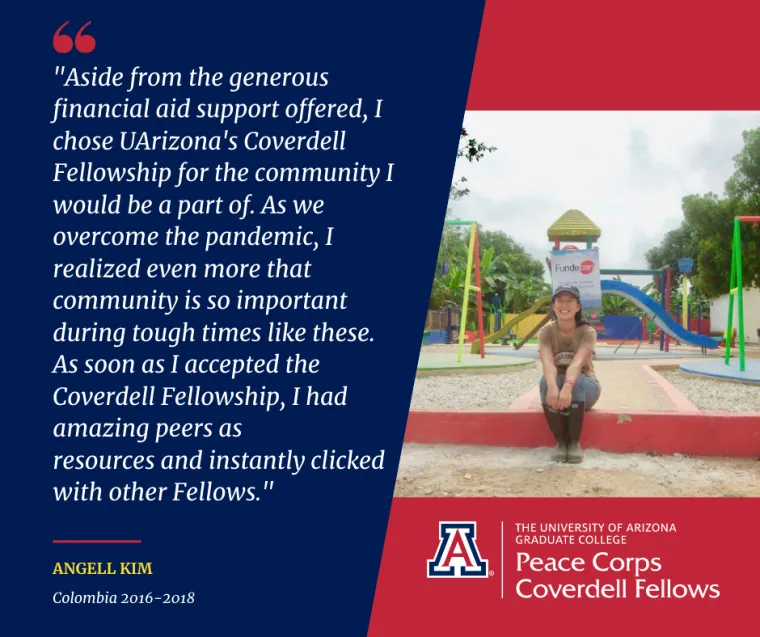- Graduate Outreach Assistantship
- Financial Assistance
- Professional Development and Leadership Opportunities
- Active RPCV Community Support
- A 50% tuition remission (a reduction of the standard base tuition).*
- GA Reduced Tuition for non-resident students who are charged at the resident rate
- Stipend of $10,965 per academic year
- UA individual student health insurance premium with coverage for the 12 month calendar year beginning in August
- 10% discount at the UA Bookstore
- Access to Family and Medical Leave (including GA Parental Leave) under certain circumstances
- GA Tuition Deferment Plan available through the Graduate College
- University holidays are observed by Fellows on the outreach assistantship
Note: Summer classes, certificate programs, and department fees are not covered
Outreach assistantships may be carried out with non-profit, educational or governmental organizations in the community or with outreach units through the university. A quarter-time assistantship is generally based on a 10 hours weekly commitment during the fall and spring semesters. Fellows are introduced to organizations and opportunities through a Virtual Career Fair held during the summer.
Graduate tuition is set by the Arizona Board of Regents each spring. *The tuition support provided by the assistantship does not support departmental differential tuition or program fees or additional fees specific to some programs. Some departments, including the Eller School (Business), Public Administration, Planning, School of Information and Library Sciences, and Public Health charge differential tuition which is not waived by the Peace Corps Fellowship or assistantships. Ask your department for details, or calculate costs at the Bursar’s website/Student Services.
The Peace Corps Fellows tuition scholarship is renewable for a second year with timely progress to degree while meeting the requirements of the Fellows program. Timely progression to degree is a key way to minimize the cost of your education.

OTHER SUPPORT
Work Study (need-based aid) of up to $3,000 per academic year will be awarded based on financial need, and may be used by Fellows at off-campus eligible employers. Additional quarter-time assistantships, AmeriCorps, or work positions may be held at the same time.
Through your department, financial aid, and extramural fellowships or scholarships, it may be possible to further reduce your costs, but this is not guaranteed. Some departments may offer additional financial support to graduate students. The amount of support varies depending on the program. You may wish to explore options such as an assistantship or scholarships; contact the graduate advisor or coordinator of the department to which you are applying for further information. Fellows work closely with the Office of Financial Aid and their academic departments to develop a competitive package. It is to your advantage to file the FAFSA early in January to maximize your awards.
If you have the opportunity to apply for extramural scholarships or fellowships, please do. Many Fellows have received additional support from programs including the National Science Foundation Graduate Research Fellowship, NSF EAPSI, Fulbright Student Awards, FLAS, Tinker, DACOR-Bacon, Fulbright-Hays Doctoral Dissertation Research Abroad, DAAD, Mongolian Studies Association, Inter-American Foundation Grassroots Fellowship, David L. Boren Fellowship, Marshall Foundation, Jack Kent Cooke Scholarship and many others.
LOANS
The outreach assistantship will offset your cost of education, but some students do take out small loans over the period of study. We encourage graduate students to minimize any debt incurred in graduate school relative to their expected income upon graduation and prior debt.

